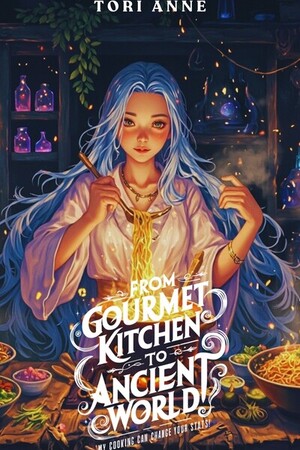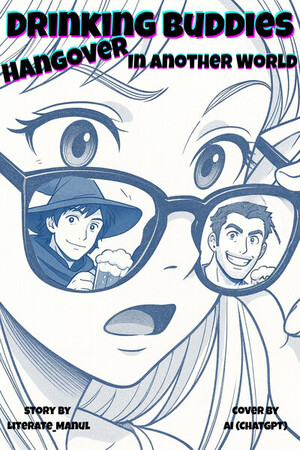Chapter 9:
Chapter 9. Biohazard
From Gourmet Kitchen to Ancient World: My Cooking Can Change Your Stats!
Emilia sat on the edge of the fur-covered bed, her eyes locked on the wooden bucket in the corner of the hut. Her face is pale, her lips pressed into a thin, horrified line. That bucket wasn’t for water. No, it's the toilet, the village’s primitive excuse for one.
She had been awake for a while now, silently staring at it as if sheer willpower could make it disappear. The faint, sour smell drifting from it made her stomach twist. Back home in Sapporo, she’d had a modern bathroom with tiles, a heated toilet seat, and running water. This is barbaric.
For days now, she hadn’t even noticed it. She had been too overwhelmed by everything else: fighting for her life in the Gloamspire Thicket, cooking for the starving villagers, and fending off monsters in the dead of night. Her body had been running on pure adrenaline, every waking moment focused on survival.
But now, the immediate danger had passed, and her mind was finally clear. With clarity came awareness. With awareness came the horrible truth. “Why, out of all the worlds, did I have to end up in one with this?” she whispered, hugging her knees.
The dawn light seeped through the cracks in the wooden walls, revealing the rough simplicity of her hut. It wasn’t much: a bed made of stacked furs, a small wooden table, a clay jug of water, and that cursed bucket in the corner.
Even though the bed had been surprisingly warm and soft enough to keep her comfortable through the night, Emilia couldn’t bring herself to relax. She had fought monsters and survived a deadly forest, but somehow, this is the thing that truly broke her.
“This isn’t just a cultural difference,” she muttered under her breath. “This is a biohazard.”
Her nose wrinkled as she forced herself to stand, careful to keep as much distance as possible between herself and the bucket. She couldn’t live like this, not with no soap, no clean water for washing, and no basic hygiene. If she stayed here too long, disease wouldn’t just spread through the village; it would spread to her.
Something had to change. And if no one here understood the concept of cleanliness, then she would just have to teach them herself. Just when she was about to do something, a foul smell crept into her nostrils.
Her nose wrinkled immediately. It's thick, pungent, and wrong. “Ugh… what is that smell?” she muttered, and she realized it came from herself.
She wanted to cry, desperately cry, looking to find a proper toilet and a proper bath. She smells like something out of the garbage bin—decayed and rotten. And she realized that something more pungent was coming from the outside.
Outside her hut, the village was already alive with activity. Men hauled carcasses of Horned Maulbeasts to be butchered, their hands stained red with dried blood. Women carried baskets of hides and smoked meat while children played barefoot in the dirt, their clothes crusted with grime. The entire area reeked of sweat, iron, and unwashed bodies, undercut by the sharp, metallic tang of blood.
“Oh… oh no,” Emilia whispered, gagging slightly. She clapped a hand over her mouth and nose.
It's clear that none of these people are aware of such basic hygiene. The villagers had no concept of bathing. The idea of wiping off with even a damp cloth seemed completely luxurious to them. Her eyes widened in horror as she realized another unpleasant truth: the bucket inside her hut was already filled with her own poop and pee.
The night before, she had been too tired to pay much attention when she’d needed to relieve herself, stumbling toward a crudely dug pit on the far edge of the village. But now, in the light of day, she saw it for what it truly was: a nightmare. A bucket buzzing with flies and crawling with who-knew-what, with no proper way to clean up afterward.
Emilia’s stomach churned violently. “Nope. Absolutely not. If I stay here, I will die, not from monsters, but from bacteria.”
Hikarimetsu materialized beside her in a shimmer of pale blue light, stretching languidly like a cat. Her white-and-crimson kimono hung loose around her shoulders, her long hair cascading down her back. “Ah, the stench of mortals. You just realized it now, my dear Master?” she said with an amused smirk.
“This isn’t funny, Hikari!” Emilia groaned, pacing around the small hut. “They don’t even bathe! There’s no soap, no proper toilets—no anything!"
Hikarimetsu tilted her head thoughtfully. “Then perhaps you should not leave.”
Emilia stopped and glared at her. “I can’t just stay here forever. I need to find a way home, remember? But I also can’t just abandon these people. They think I’m some kind of chosen one, their “Pathbreaker.” She let out a long, frustrated sigh. “If I’m going to leave someday, I need to make sure they can survive without me. That means food, medicine, and… basic hygiene.”
The sword spirit raised a delicate brow. “That sounds like a difficult task, Master. Where will you even begin?”
Emilia sank back into the mound of fur bedding, the rough pelts scratching against her skin as she rubbed her temples with both hands. Her mind was a whirlpool of thoughts, each one more pressing than the last.
The images of her earlier days in this world came rushing back: the terrifying depths of Gloamspire Thicket, the ambushes, the poison, and the endless running and fighting for survival.
But mixed into those memories was something softer, almost comforting: the image of a fresh, bubbling spring hidden deep within the thicket. Cool, crystal-clear water, untouched by blood or filth, where she had been able to wash off the grime and sweat of battle for the first time since being thrown into this strange world.
And not just the water; there had been plants there, soft, broad leaves with fibrous textures. She remembered tearing one up in desperation to wipe the mud off her face. It wasn’t exactly tissue paper, but it had been something. She was looking for something cleaner than using her hands, or at least the alternatives she had seen here.
Her eyes flicked to the bucket in the corner of the hut again. A shudder ran down her spine. “We need to go back to that damn forest,” she muttered, her voice heavy with dread but firm with determination.
Hikarimetsu's soft, velvety voice purred. “I don’t mind,” Hikarimetsu replied, her golden eyes glimmering with mischief. “The forest is… thrilling. Full of life and death in perfect balance. Just the kind of place I enjoy.”
Emilia shot her a flat look. “Yeah, well, I don’t enjoy it. But we don’t have a choice.”
Hikarimetsu tilted her head, a knowing smirk tugging at her lips. “You mean, you don’t have a choice. I, on the other hand, could happily stay right here, watching you squirm every time you look at that bucket.”
“Not funny,” Emilia groaned, throwing a piece of fur at her companion.
Emilia's face filled with desperation. She leaned forward, resting her elbows on her knees, and spoke more seriously. “And I need to figure out if anything edible in there can be cultivated outside the forest.”
Hikarimetsu raised an eyebrow, intrigued. “Cultivated? You mean… farming?”
“Exactly,” Emilia said, nodding firmly. “Think about it, the mooncap fungus and the deathveil caps I found in the thicket saved us more than once. I used them to brew antidotes, poisons… even medicines that could treat wounds faster than anything these villagers have ever seen. And killed those beasts.” She gestured vaguely toward the village beyond the hut’s walls. “If I can figure out how to grow them here, outside that cursed forest, the villagers wouldn’t have to depend on me every time something goes wrong.”
Hikarimetsu crossed her arms, her expression thoughtful but faintly amused. “So you want to teach them to fend for themselves.”
Emilia nodded, her voice growing stronger with every word. “Yes. Right now, they’re completely dependent on what I bring back. If I leave or if something happens to me—they’ll just fall apart. I can’t let that happen.”
Her gaze hardened with determination. “If they can grow their own food, make their own poisons and antidotes, and even figure out the basics of hygiene, this village could become self-sufficient. They wouldn’t just survive… they’d thrive.”
Hikarimetsu smirked again, though there's genuine respect in her eyes this time. “My, my. Such noble ambitions, Master. Are you sure you’re not trying to build an empire?”
Emilia rolled her eyes. “Please. I just want to make sure these people don’t die from something preventable. Like, say… tetanus.”
The sword spirit tilted her head, clearly not recognizing the word. Emilia didn’t bother explaining. Instead, she got to her feet, her jaw set. “Step one,” she muttered, determination sparking in her tired eyes, “is figuring out how to grow those mushrooms. If we can farm them instead of foraging, we won’t need to risk lives in the forest every time someone gets sick or injured.”
“And step two?” Hikarimetsu asked, lounging against the wall, her expression unreadable.
Emilia glanced around the small hut, then peered through the doorway at the bustling village. “More food sources. The Maulbeast meat is amazing, sure, but relying on hunting alone isn’t sustainable. If a bad winter comes or the beasts migrate, they’ll starve.” She shuddered. “I need to introduce crops. And for the love of all that’s holy, soap. If I have to smell another armpit like that, I’ll lose my mind.”
The sword spirit chuckled softly. “You sound less like a warrior and more like a… what do you mortals call it? A housewife.”
Emilia shot her a glare sharp enough to cut steel. “Hikari, shut it.” Hikarimetsu smirked but wisely said nothing further.
Taking a deep breath, Emilia stood and tied her hoodie around her waist. She adjusted her pouch, checking the supplies she had left. She had a few small vials of antidote, dried mushroom samples, and some crude tools that she had improvised. It isn’t much, but it would have to do.
“Let's go back to the forest! I need a bath!” she declared.




Please sign in to leave a comment.